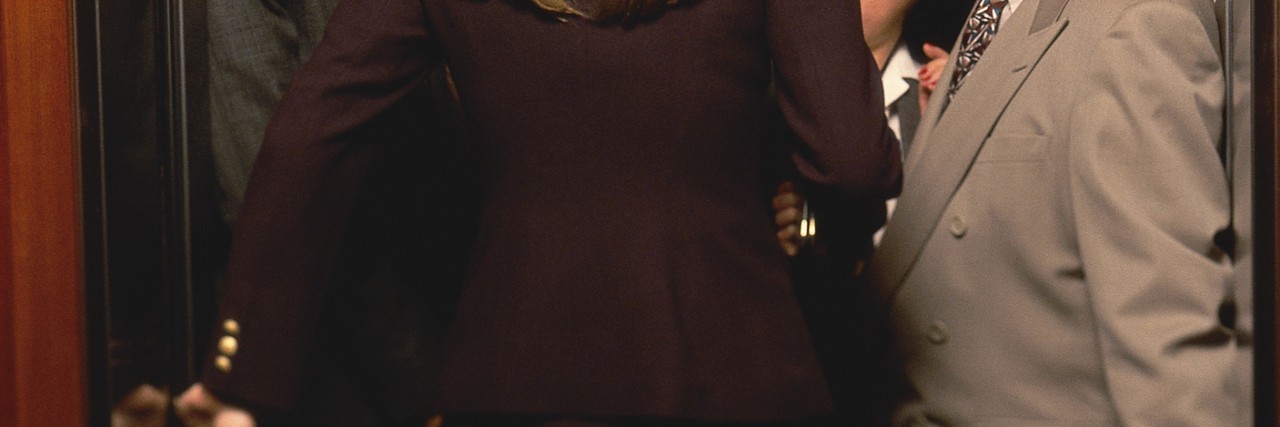How NYC Elevators Helped Me Prepare for My MRI
I’ve ridden in a stretch limo twice. The first time was when I participated in a muscular dystrophy fundraiser. Having missed my prom, I was really psyched to ride in one, but being in the back of a stretch limo by yourself is actually a lot like missing your prom. Only when you’re 30.
The second time was when they found me on the floor at work, unable to move from a migraine. There were no cabs available and I somehow found myself laying down in the back of the long white car, trying not to throw up. It was never clear to me who got the car, why a limo, and why now, and not at 17, when I would have appreciated it. I always wondered what the driver thought. What did the neighbors think, seeing me crawl into my little love nest, which was not all that much bigger than the car.
My boss was not going to let up on me until I went to the doctor. Open magnetic resonance imaging was all the rage, and I wasn’t too nervous about it. I had my first migraine when I was 14, and just about one every month after that, so I was pretty confident the diagnoses was going to be what I had termed, “Killer Premenstrual Syndrome.”
After they put me on the table, I couldn’t understand how this MRI was any better than a traditional one might be, and I was glad they gave me “something to relax with” because I was feeling mighty claustrophobic.
When I worked on the 21st floor of 2 Penn Plaza in NYC, it took me a couple of days to figure out the elevators. I didn’t understand they didn’t all go to the same floors and the signs mystified me. It was a fairly formal place and I enjoyed the train ride in and wearing heels every day, tennis shoes in the tote bag. I didn’t have to go outdoors to get the train. The worst part of the commute was getting in the elevators. The first time I tried to get one, people packed in and I was left standing there. Two or three more elevators came and went, sans me. Eventually I was standing there when a guy sees my panic growing. He grabs me and yanks me in. My eyes misted up. He said “Sorry, but if you want to go up, this is what you gotta do.” I would probably still be standing there if it weren’t for this kind man. Until my first MRI, that is the most claustrophobic I had ever been.
If I turned my head I could see out of the side of the machine, but after they put some padding around me, I could no longer turn my head. When I left I was so woozy I could hardly walk. The “something to relax with” was powerful. It was as if something was pressing on the part of my brain that filters speech.
The next day came the urgent call: pick up the films right away. When we got there, the same beautiful, comforting nurse gave them to me and said “good luck, honey.” I was pretty sure “good luck” was not a medical term. On the way out, I looked over my shoulder and said, “I told them I had a headache.”
***
Here are some tips if you or someone you know is going to have an MRI soon:
1. If you haven’t had one in a while, the whole situation is greatly improved from how it used to be. If you are claustrophobic, let them know ahead of time, so they have time to medicate you. They might recommend you take something before you leave your house.
2. If you prescription says “with contrast,” as it likely will, you will get an IV. If this idea is bothersome, let them know ahead of time so they can medicate you.
3. The contrast will feel cold in your veins. It is startling the first time.
4. Drink lots of water to hydrate your veins, which will help with the IV.
5. The MRI will be loud. They will give you earplugs. The MRI will still be loud. If you are nervous about this, let them know ahead of time so they can medicate you if necessary.
6. Lots of people will tell you how it is “no big deal” to get an MRI, and I suppose for lots of people, that’s true. I’m just advising for your first one, there is no reason to be a hero if you are nervous about it. They have to know in advance sometimes if you are going to “need a little something” for your nerves.
7. If you have a condition requiring future monitoring, you most likely will get used to the claustrophobia and the noise. Meditation and hypnosis are two ways that can help.
Follow this journey on Jaye’s Brain
The Mighty is asking the following: Create a list-style story of your choice in regards to disability, disease or mental illness. Check out our Submit a Story page for more about our submission guidelines.

